Robin Lythgoe's Blog, page 29
October 18, 2013
New Release by Matthew Keith
Author Matthew Keith has just released Indicium Rising, Book 2 of his series, Watchers of the Night. To celebrate, the first book is on sale for 99¢ until the end of the month. Don't miss this action-packed sequel as Paul and the rest of the gang at Astralis go head-to-head with a new and dangerous adversary. Hurry and grab your copy!
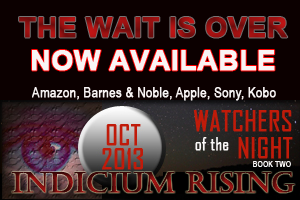
Paul Bennett is a Walker--someone who walks the night in their dreams free of their body--and a member of Astralis, an agency funded by the UN that uses Walkers to gather intelligence.
A rogue Walker from Astralis attempted to take over the agency six months previous, but failed. Now, he has formed his own agency. He has declared war on Astralis and will stop at nothing to gain control of every Walker on the world.
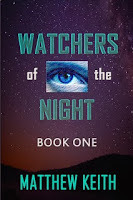
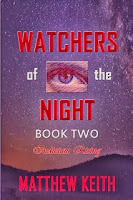 Watchers of the Night, Book 1Watchers of the Night, Book 2: Indicium Rising
Watchers of the Night, Book 1Watchers of the Night, Book 2: Indicium Rising

Paul Bennett is a Walker--someone who walks the night in their dreams free of their body--and a member of Astralis, an agency funded by the UN that uses Walkers to gather intelligence.
A rogue Walker from Astralis attempted to take over the agency six months previous, but failed. Now, he has formed his own agency. He has declared war on Astralis and will stop at nothing to gain control of every Walker on the world.

 Watchers of the Night, Book 1Watchers of the Night, Book 2: Indicium Rising
Watchers of the Night, Book 1Watchers of the Night, Book 2: Indicium Rising
Published on October 18, 2013 20:36
October 17, 2013
Fall Into Fantasy (With a Massive Giveaway!)
 Fall is such an amazing time of year—What's not to love about the changing colors, the crisp scent in the air, ripening apples, cider, pumpkins, comfy sweaters ... And then we have those wonderfully gloomy days of threatening clouds and rain and the promise of coming snow. Obviously, 'tis the season of Books, Hot Cocoa (or cider!), and a Cozy Chair!
Fall is such an amazing time of year—What's not to love about the changing colors, the crisp scent in the air, ripening apples, cider, pumpkins, comfy sweaters ... And then we have those wonderfully gloomy days of threatening clouds and rain and the promise of coming snow. Obviously, 'tis the season of Books, Hot Cocoa (or cider!), and a Cozy Chair!Coincidentally, I happen to know where you can fall into a ton of Book Booty. The amazing Ash Krafton is hosting a giveaway that will run from October 17 through October 31. More than FIFTY authors of fantasy and paranormal books are giving away eBooks, print books, magazines and swag! Booyah, baybee!
I hope you’re ready to start clicking and start winning, because the Rafflecopter awaits! Check out the books that are included, then scroll your way down the page to the raffle form. There are LOTS (heaps! scores! gobs!) of opportunities for winning!



And now the moment you've been waiting for:a Rafflecopter giveaway
Published on October 17, 2013 11:37
October 11, 2013
FLASH SALE!
Hello, world! I'm celebrating my 100th post with a sale!
Okay, that's not the real story. It's just a fantastic coincidence that my sale announcement and Post Number 100 are happening on the same day. But cool, right?
For just one day—this coming Monday, October 14th—As the Crow Flies will be on sale for a mere 99¢. Spread the word! Tell your friends! Post to all your social hangouts! Please feel free to swipe the banner and share! Share! Share!

Okay, that's not the real story. It's just a fantastic coincidence that my sale announcement and Post Number 100 are happening on the same day. But cool, right?
For just one day—this coming Monday, October 14th—As the Crow Flies will be on sale for a mere 99¢. Spread the word! Tell your friends! Post to all your social hangouts! Please feel free to swipe the banner and share! Share! Share!

Published on October 11, 2013 06:30
October 4, 2013
Peer Reviews: Fair Or Foul?
Peer reviews—authors reviewing authors—are the subject of frequent and heated debate. I'm so pleased to bring to you today the first episode of a new panel discussion that will be featured on the first Friday of every month. We are fantasy writers, and we'll be discussing the industry and our experiences, and we plan to throw in some fun things as well. Our first topic? Peer reviews. (You guessed that, didn't you?) Enjoy!

 KRISTIE KIESSLING
KRISTIE KIESSLING
Author of the short story, Sanguis Dei and a poetry collection, Light and Dark
Kristie's Blog
The peer review. Just the words are frightening. They should be. When it comes to writing scientific journals, the peer review can often determine whether or not a scientist's paper is published at all and if published, taken seriously. The concept of the peer review is honored by its roots in the dialogues of Plato. In the tradition of Socrates, peer reviews in science are all about questioning, challenging and turning suppositions and pre-suppositions, inside out. Follow the data! What is the truth? Thank goodness that peer reviews in the world of writing are not so consequential. Then again, aren't they?
It can be more than terrifying when an author hands over his or her baby to a group of peers for that precious document to be dissected and evaluated. Often, a writer will take the things said by such reviewers as gospel. Condemnation by one's peers that the work is awful can lead to the thought that one should never publish. The gold star review that says, "publish everything you write! You're amazing! Do it now!" can be just as detrimental. However, when a writer's focus is on the words he or she has written, rather than what he or she thinks others think of him or her, a peer review can be an valuable tool toward improvement. Often, we focus on not being good enough when, delightfully, we can always learn, study and rewrite.
As authors of fiction—be it science, fantasy or historical—we go to our peers for their input because they are the fact-makers. They are the world-builders. Our fictional worlds need to make sense, even when they come completely out of our heads. (I've often been told I'm out of mine...) If one thing does not lead logically to another, even in the most fantastic world, we might be left with the question: "Why is a raven like a writing desk?" A question even Charles Lutwidge Dodgson never really answered to my satisfaction. Still, I thank God that no peer reviewer stopped him from creating such a Wonderland.
In the end, the peer review must be taken with quiet dignity and grace and a few grains of salt. The writer must keep on writing, humbled that others take an interest and encouraged that there is room in the world for all manner of works, no matter what anyone says.
 C.M.J. WALLACE
C.M.J. WALLACE
Author of The Rift Series (beginning with Sing the Midnight Stars)
C.M.J.'s website
I’m undecided about exchanging book reviews with authors. A sticky question of ethics rears its ugly head the instant the deal is made because each author writes the review with the understanding that it’s going to be quid pro quo, and however much we tell ourselves that we can be unbiased, it just ain’t so. We’re a morass of prejudices that include everything from food preferences to standards of beauty.
I’ve had two interesting (and enlightening) experiences with review trades. I didn’t know the author of the first one I did. He posted a Goodreads thread asking for review exchanges and we swapped books, I giving him a Smashwords coupon for a free download and he sending me a paperback. He finished mine first and gave it 5 stars on Goodreads without posting his review elsewhere. A week or so later, I finished his and gave it 4 stars. Shortly after that, he posted his review of my book on Smashwords and gave it 4 stars. The lesson? He’d expected me to give his book 5 stars because that’s what he gave mine. Truth be told, his didn’t deserve even 4 stars, but I allowed an element of guilt to influence my rating: He’d spent the time and money to send me a paperback. That’s one problem with review exchanges. What would he have done had I rated his book 3 stars or lower? Unfortunately, indie authors can’t afford to discount the possibility of retributive ratings. That’s another problem with trading reviews.
The second exchange was with a Goodreads friend, but we bought each other’s books through a program on Facebook. I finished hers first and gave it 4 stars because it really does merit that rating, but I pointed out in my review that it had editorial problems. Then she finished mine and gave it 5 stars, which pleasantly surprised me not (entirely) because of the rating but because—let’s face it—friend or not, I really don’t know her and expected strict quid pro quo at best. Did the fact that we’d paid for each other’s books free us from tit for tat? I don’t know. But I do know that I feel more comfortable reviewing books by authors with whom I’ll never have any interaction.
 PATRICIA REDING
PATRICIA REDING
Author of Oathtaker
Patricia's website
A peer is a person who is “equal to another in abilities, qualifications, age, background and social status.” Thus, I begin by saying that I do not feel I’ve earned the right to call many other writers my “peers.” They have been at this much longer than I and have accomplished much more than I. They are not “equal” to me—they are superior to me. I acknowledge that fact and I honor them for it. Further, I cannot speak to how others might review my work, as I cannot know their intentions. So, I find I am limited to speaking to how I review the works of others. Whether fair or foul, I will leave to you to decide.
To be honest, I divide other writers into groups. First are those who are enjoying the fame of mass publication by traditional publishing companies or who have already made it big as indie authors. While I am in no way the “peer” of such authors, I find it easier to review and rate their works. Why? I suppose because I feel that my rating will make no difference to the success of these writers or to what others might think of their works. Thus, I am free to rate based on nothing more than how much I enjoyed the work.
Then, there are the indie-published authors. Their works are the most difficult for me to review because my reviews of these works might actually matter—to the authors themselves and to prospective future readers who may decide on the basis of my words of praise or criticism, whether to give a work a try. Even so, I still only give a four or five star rating when I find a work truly well written, with an engaging and novel story line, elements of surprise, musical prose and, perhaps, a bit of literary magic. To me, that is fair, both to the author and to prospective future readers.
On the other end of the spectrum are the one- and two-star works. In truth, I’ve only ever read one work that was a one-star work. It was, in short, the single worst thing I have ever read. Ever. Period. I did not post a review for the work. I wrote one (so that I could vent), but I posted nothing. So no harm, no foul. Or, was it? Should prospective readers be made aware of such works before they spend their hard earned money on them? Are other indie authors damaged when poor works are not called out? I will leave that for you to decide. Having said that, an indie work that I rate two stars is one I believe has promise. There are significant issues with the work, but they are not insurmountable. In short, there is something that makes the work worthy of more than a single star.
That leaves the three-star middle. For me, this rating means that the work may not have moved me—personally—in a deep and significant way, but others may very well enjoy the work. It matters not whether the work fits within one of my generally preferred genres or how I might have done something differently. These are simply works that are well enough done that others might truly enjoy them. As a three-star rating is not a poor one, I contend that such a review is a fair one.
And My Word on the Subject...
The question of whether or not it’s a bad idea for an author to give critical reviews of the work of other authors comes up frequently on boards and forums all across the internet, and I don’t think it’s one that will some day fade away. While “peer review” can be a delicate undertaking, it can also be a useful barometer. Who better to read and critique the work of authors than other authors (who, we fervently hope, are avid readers, too)? The key is to critique constructively, not to be critical. And you’ve stepped into marshy ground right out of the gates, because true objectivity is nearly impossible to achieve. We humans are subjective. It’s how we’re built.
We’re in an interesting place in the world of publishing. When the “Big Six” stopped being main gatekeepers, a veritable flood of books hit the market. I truly admire the sense of exuberance and determination that comes with the ability to self-publish. And yet… readers expect (and deserve) a certain level of professionalism that is often missing. We have become our own gatekeepers. How does that happen? Through reviews. Reviews are critical to boosting the visibility of any work. Some authors claim that the negative ones lend credibility; working, I assume, on the theory that you can’t please all the people all the time, and even well-known authors get bad reviews. While a single review won’t likely make or break a book, several reviews describing the same flaws can help the author identify weak places and help develop stronger skills. Reviews given in a positive and respectful manner help both the writer and the industry.
However, authors giving bad reviews to other authors opens an icky can of worms. (Are you keeping up here with how I’m mixing my metaphors?) For starters, that bad review is going to hurt more than a negative review from Joe Reader. Authors come with an implied sense of authority, whether it’s truly earned or not. Secondly, the author handing out bad reviews runs the risk of losing readers. Fans of the condemned books will likely decide they don’t agree with you about what makes a good story, and there goes your sale.
And another detail to trip up the unwary? The various places where you can post a rating DO NOT GIVE THE SAME VALUE to stars. Amazon’s 2-stars means “don't like it,” while Goodreads’ 2-stars means “it was okay.” A person can give a 4-star review on Amazon, and when they give a 3-star review with the very same verbiage on Goodreads, it means the same thing. “Liked it.”
So how about the notion of authors exchanging reviews? I did a couple of review exchanges shortly after the release of my book and… I don’t like it. I want the person reading my book to do an honest review, for better or worse, and I want to do the same with theirs. I can’t, in good conscience as one of the industry gatekeepers, give a good review for a terrible book. If I can barely choke out a 2-star review and they worship and adore me with a 5-star review, it seems unfair. Illogical, but unfair. Since those first experiences I’ve adopted the moderately satisfactory practice of not publicly posting reviews under three stars, and offering to pass that would-be review (generally more detailed than I would otherwise write) on to the author. If that helps them at all improve their work, I am pleased as punch. I want to help. I am delighted that people take the time out of their busy schedules to give their opinions of my work, either helping me grow or giving me the thrill of a job well done. Sometimes both!
So what do you think? Have you any experience with review exchanges? An opinion about whether it's acceptable or not? Talk to us!

 KRISTIE KIESSLING
KRISTIE KIESSLINGAuthor of the short story, Sanguis Dei and a poetry collection, Light and Dark
Kristie's Blog
The peer review. Just the words are frightening. They should be. When it comes to writing scientific journals, the peer review can often determine whether or not a scientist's paper is published at all and if published, taken seriously. The concept of the peer review is honored by its roots in the dialogues of Plato. In the tradition of Socrates, peer reviews in science are all about questioning, challenging and turning suppositions and pre-suppositions, inside out. Follow the data! What is the truth? Thank goodness that peer reviews in the world of writing are not so consequential. Then again, aren't they?
It can be more than terrifying when an author hands over his or her baby to a group of peers for that precious document to be dissected and evaluated. Often, a writer will take the things said by such reviewers as gospel. Condemnation by one's peers that the work is awful can lead to the thought that one should never publish. The gold star review that says, "publish everything you write! You're amazing! Do it now!" can be just as detrimental. However, when a writer's focus is on the words he or she has written, rather than what he or she thinks others think of him or her, a peer review can be an valuable tool toward improvement. Often, we focus on not being good enough when, delightfully, we can always learn, study and rewrite.
As authors of fiction—be it science, fantasy or historical—we go to our peers for their input because they are the fact-makers. They are the world-builders. Our fictional worlds need to make sense, even when they come completely out of our heads. (I've often been told I'm out of mine...) If one thing does not lead logically to another, even in the most fantastic world, we might be left with the question: "Why is a raven like a writing desk?" A question even Charles Lutwidge Dodgson never really answered to my satisfaction. Still, I thank God that no peer reviewer stopped him from creating such a Wonderland.
In the end, the peer review must be taken with quiet dignity and grace and a few grains of salt. The writer must keep on writing, humbled that others take an interest and encouraged that there is room in the world for all manner of works, no matter what anyone says.
 C.M.J. WALLACE
C.M.J. WALLACEAuthor of The Rift Series (beginning with Sing the Midnight Stars)
C.M.J.'s website
I’m undecided about exchanging book reviews with authors. A sticky question of ethics rears its ugly head the instant the deal is made because each author writes the review with the understanding that it’s going to be quid pro quo, and however much we tell ourselves that we can be unbiased, it just ain’t so. We’re a morass of prejudices that include everything from food preferences to standards of beauty.
I’ve had two interesting (and enlightening) experiences with review trades. I didn’t know the author of the first one I did. He posted a Goodreads thread asking for review exchanges and we swapped books, I giving him a Smashwords coupon for a free download and he sending me a paperback. He finished mine first and gave it 5 stars on Goodreads without posting his review elsewhere. A week or so later, I finished his and gave it 4 stars. Shortly after that, he posted his review of my book on Smashwords and gave it 4 stars. The lesson? He’d expected me to give his book 5 stars because that’s what he gave mine. Truth be told, his didn’t deserve even 4 stars, but I allowed an element of guilt to influence my rating: He’d spent the time and money to send me a paperback. That’s one problem with review exchanges. What would he have done had I rated his book 3 stars or lower? Unfortunately, indie authors can’t afford to discount the possibility of retributive ratings. That’s another problem with trading reviews.
The second exchange was with a Goodreads friend, but we bought each other’s books through a program on Facebook. I finished hers first and gave it 4 stars because it really does merit that rating, but I pointed out in my review that it had editorial problems. Then she finished mine and gave it 5 stars, which pleasantly surprised me not (entirely) because of the rating but because—let’s face it—friend or not, I really don’t know her and expected strict quid pro quo at best. Did the fact that we’d paid for each other’s books free us from tit for tat? I don’t know. But I do know that I feel more comfortable reviewing books by authors with whom I’ll never have any interaction.
 PATRICIA REDING
PATRICIA REDINGAuthor of Oathtaker
Patricia's website
A peer is a person who is “equal to another in abilities, qualifications, age, background and social status.” Thus, I begin by saying that I do not feel I’ve earned the right to call many other writers my “peers.” They have been at this much longer than I and have accomplished much more than I. They are not “equal” to me—they are superior to me. I acknowledge that fact and I honor them for it. Further, I cannot speak to how others might review my work, as I cannot know their intentions. So, I find I am limited to speaking to how I review the works of others. Whether fair or foul, I will leave to you to decide.
To be honest, I divide other writers into groups. First are those who are enjoying the fame of mass publication by traditional publishing companies or who have already made it big as indie authors. While I am in no way the “peer” of such authors, I find it easier to review and rate their works. Why? I suppose because I feel that my rating will make no difference to the success of these writers or to what others might think of their works. Thus, I am free to rate based on nothing more than how much I enjoyed the work.
Then, there are the indie-published authors. Their works are the most difficult for me to review because my reviews of these works might actually matter—to the authors themselves and to prospective future readers who may decide on the basis of my words of praise or criticism, whether to give a work a try. Even so, I still only give a four or five star rating when I find a work truly well written, with an engaging and novel story line, elements of surprise, musical prose and, perhaps, a bit of literary magic. To me, that is fair, both to the author and to prospective future readers.
On the other end of the spectrum are the one- and two-star works. In truth, I’ve only ever read one work that was a one-star work. It was, in short, the single worst thing I have ever read. Ever. Period. I did not post a review for the work. I wrote one (so that I could vent), but I posted nothing. So no harm, no foul. Or, was it? Should prospective readers be made aware of such works before they spend their hard earned money on them? Are other indie authors damaged when poor works are not called out? I will leave that for you to decide. Having said that, an indie work that I rate two stars is one I believe has promise. There are significant issues with the work, but they are not insurmountable. In short, there is something that makes the work worthy of more than a single star.
That leaves the three-star middle. For me, this rating means that the work may not have moved me—personally—in a deep and significant way, but others may very well enjoy the work. It matters not whether the work fits within one of my generally preferred genres or how I might have done something differently. These are simply works that are well enough done that others might truly enjoy them. As a three-star rating is not a poor one, I contend that such a review is a fair one.
And My Word on the Subject...
The question of whether or not it’s a bad idea for an author to give critical reviews of the work of other authors comes up frequently on boards and forums all across the internet, and I don’t think it’s one that will some day fade away. While “peer review” can be a delicate undertaking, it can also be a useful barometer. Who better to read and critique the work of authors than other authors (who, we fervently hope, are avid readers, too)? The key is to critique constructively, not to be critical. And you’ve stepped into marshy ground right out of the gates, because true objectivity is nearly impossible to achieve. We humans are subjective. It’s how we’re built.
We’re in an interesting place in the world of publishing. When the “Big Six” stopped being main gatekeepers, a veritable flood of books hit the market. I truly admire the sense of exuberance and determination that comes with the ability to self-publish. And yet… readers expect (and deserve) a certain level of professionalism that is often missing. We have become our own gatekeepers. How does that happen? Through reviews. Reviews are critical to boosting the visibility of any work. Some authors claim that the negative ones lend credibility; working, I assume, on the theory that you can’t please all the people all the time, and even well-known authors get bad reviews. While a single review won’t likely make or break a book, several reviews describing the same flaws can help the author identify weak places and help develop stronger skills. Reviews given in a positive and respectful manner help both the writer and the industry.
However, authors giving bad reviews to other authors opens an icky can of worms. (Are you keeping up here with how I’m mixing my metaphors?) For starters, that bad review is going to hurt more than a negative review from Joe Reader. Authors come with an implied sense of authority, whether it’s truly earned or not. Secondly, the author handing out bad reviews runs the risk of losing readers. Fans of the condemned books will likely decide they don’t agree with you about what makes a good story, and there goes your sale.
And another detail to trip up the unwary? The various places where you can post a rating DO NOT GIVE THE SAME VALUE to stars. Amazon’s 2-stars means “don't like it,” while Goodreads’ 2-stars means “it was okay.” A person can give a 4-star review on Amazon, and when they give a 3-star review with the very same verbiage on Goodreads, it means the same thing. “Liked it.”
So how about the notion of authors exchanging reviews? I did a couple of review exchanges shortly after the release of my book and… I don’t like it. I want the person reading my book to do an honest review, for better or worse, and I want to do the same with theirs. I can’t, in good conscience as one of the industry gatekeepers, give a good review for a terrible book. If I can barely choke out a 2-star review and they worship and adore me with a 5-star review, it seems unfair. Illogical, but unfair. Since those first experiences I’ve adopted the moderately satisfactory practice of not publicly posting reviews under three stars, and offering to pass that would-be review (generally more detailed than I would otherwise write) on to the author. If that helps them at all improve their work, I am pleased as punch. I want to help. I am delighted that people take the time out of their busy schedules to give their opinions of my work, either helping me grow or giving me the thrill of a job well done. Sometimes both!
So what do you think? Have you any experience with review exchanges? An opinion about whether it's acceptable or not? Talk to us!
Published on October 04, 2013 07:46
September 27, 2013
"What’s Past Is Prologue"
I use Grammarly's grammar check because it makes it so easy to blitz grammar on the fritz! (This post brought to you today by Grammarly, the letter R, and numbers three through five.)
 "What’s past is prologue" is a quotation by William Shakespeare from his play The Tempest.
"What’s past is prologue" is a quotation by William Shakespeare from his play The Tempest.
As the phrase was originally used in The Tempest, Act 2, Scene I, it means that all that has happened before that point (the past) has set the stage for the present. So it is with the prologue (or prelude) in novel form.
I've read a lot of articles that claim a prologues is the kiss of death; editors hate 'em and readers skip 'em. I'm not sure what that makes me, because I read them, except when... Well, we'll get to that in a moment. Curious about this all-encompassing denouncement, I went to my library and plucked three books from the shelves: Robert Jordan's The Eye of the World, Brandon Sanderson's The Way of Kings (which is signed, I'll have you know!), and George R. R. Martin's A Game of Thrones. I picked them because they're well-known authors and best-selling books. And guess what? All three of them have prologues.
create a settingdevelop conflictintroduce charactersset the tonedrive the story forwardI went crazy and randomly picked four more books off my shelves. The Crystal Cave by Mary Stewart. The Fellowship of the Ring by J.R.R. Tolkien. Stormrider by David Gemmel. Wizard's First Rule by Terry Goodkind was the only one that didn't have a prologue.
I decided to branch out a bit from fantasy: Lady of the Forest by Jennifer Roberson, Hood by Stephen R. Lawhead, The Bourne Identity by Robert Ludlum? Guess what? Prologues every one.
Why are so many people so anti-prologue? As I said earlier, I read prologues, except when...
First I'm going to say that the exceptions are rare. Second, I'll tell you why: They're a blah, blah, blah massive information dump. The entire history of the world before Joe Protagonist ever makes a first appearance. Yes, that turns me off at the first page, and there's a fifty/fifty chance I won't even bother with chapter one.
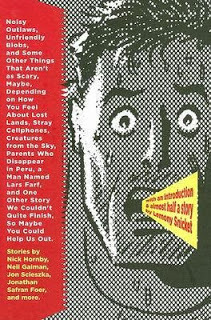 Title on the left,
Title on the left,
intro/prologue on the rightAside from the obvious no-no of the History of the World Prologue, there are the bad prologues (though it usually takes a little investment of time to discover them). Bad prologues mess with your head, confuse you, irritate you.They're really long. Like... a whole chapter. About something that doesn't even make sense when we finally get to Joe Protagonist's real dilemma.They're written in a voice or style entirely different from the rest of the book.They don't have anything to do with the rest of the book.They're short and exciting to hook us in, but chapter one is slow and boring.Lital Talmor has written an excellent article about prologues, Where to Begin? When, Where and How to Write a Prologue, in which she discusses the types or jobs of a good prologue:The "future protagonist" prologue shows the hero or heroine some time after the main part of the plot has taken place.The "past protagonist" prologue is generally used when the protagonist has a defining moment in his past which must be known to the reader, in order for the reader to understand this character.A different POV prologue describes a certain event from a point-of-view different than the main characters of the plot. This event may occur in the same time-frame as the plot, or years before or after.A background prologue can usually be found in the science-fiction and fantasy genre, where the settings may differ so wildly from our own world, that without a proper explanation the reader might get lost.Number 4 is often in extreme danger of becoming an info dump. After all, if we had wanted an encyclopedia or history, we would have acquired one.
I was curious to see how my first selection of famous-books-and-authors-with-prologues fared when it came to chapter one.
Robert Jordan's The Eye of the World: "The Wheel of Time turns, and Ages come and pass, leaving memories that become legend." Wow. Good thing he had a prologue that really gripped me. Things didn't get interesting until the last sentence in paragraph three, which was at the very bottom of the page. Cutting it a little close there...
Brandon Sanderson's The Way of Kings: ""I'm going to die, aren't I?" Cenn asked." I can't really say I feel invested enough in the character enough to care. A few lines further on we discover Cenn is about to go into battle. Sanderson got really daring and had a prelude before his prologue. It was interesting, but... Really? Two "befores"?
George R. R. Martin's A Game of Thrones: "The morning had dawned clear and cold, with a crispness that hinted at the end of summer." Luckily, the very next line talks about going to see a man beheaded. Okay, not so lucky for the fellow losing his head, but Martin breaks another cardinal rule by opening with a line about the weather. Yawn.
You can find out more about prologues here:Pro(logue) or Con by Jemi FraserThe Prologue - When to Write One, How to Use One by Marg McAlisterHow To Write A Prologue People Won't Skip by Rachel Aaron
How do you feel about prologues? Love them? Hate them? I've set up a poll—or I'd love to read your detailed opinion here in the comments.
 "What’s past is prologue" is a quotation by William Shakespeare from his play The Tempest.
"What’s past is prologue" is a quotation by William Shakespeare from his play The Tempest.As the phrase was originally used in The Tempest, Act 2, Scene I, it means that all that has happened before that point (the past) has set the stage for the present. So it is with the prologue (or prelude) in novel form.
I've read a lot of articles that claim a prologues is the kiss of death; editors hate 'em and readers skip 'em. I'm not sure what that makes me, because I read them, except when... Well, we'll get to that in a moment. Curious about this all-encompassing denouncement, I went to my library and plucked three books from the shelves: Robert Jordan's The Eye of the World, Brandon Sanderson's The Way of Kings (which is signed, I'll have you know!), and George R. R. Martin's A Game of Thrones. I picked them because they're well-known authors and best-selling books. And guess what? All three of them have prologues.
"The palace still shook occasionally as the earth rumbled in memory, groaned as if it would deny what had happened." (The Eye of the World)
"Szeth-son-son-Vallano, Truthless of the Shnovar, wore white on the day he was to kill a king." (The Way of Kings)
""We should start back," Gared urged as the woods began to grow dark around them." (A Game of Thrones)All three of them perform, in the very first line, what an opening is supposed to do:
create a settingdevelop conflictintroduce charactersset the tonedrive the story forwardI went crazy and randomly picked four more books off my shelves. The Crystal Cave by Mary Stewart. The Fellowship of the Ring by J.R.R. Tolkien. Stormrider by David Gemmel. Wizard's First Rule by Terry Goodkind was the only one that didn't have a prologue.
I decided to branch out a bit from fantasy: Lady of the Forest by Jennifer Roberson, Hood by Stephen R. Lawhead, The Bourne Identity by Robert Ludlum? Guess what? Prologues every one.
Why are so many people so anti-prologue? As I said earlier, I read prologues, except when...
First I'm going to say that the exceptions are rare. Second, I'll tell you why: They're a blah, blah, blah massive information dump. The entire history of the world before Joe Protagonist ever makes a first appearance. Yes, that turns me off at the first page, and there's a fifty/fifty chance I won't even bother with chapter one.
 Title on the left,
Title on the left, intro/prologue on the rightAside from the obvious no-no of the History of the World Prologue, there are the bad prologues (though it usually takes a little investment of time to discover them). Bad prologues mess with your head, confuse you, irritate you.They're really long. Like... a whole chapter. About something that doesn't even make sense when we finally get to Joe Protagonist's real dilemma.They're written in a voice or style entirely different from the rest of the book.They don't have anything to do with the rest of the book.They're short and exciting to hook us in, but chapter one is slow and boring.Lital Talmor has written an excellent article about prologues, Where to Begin? When, Where and How to Write a Prologue, in which she discusses the types or jobs of a good prologue:The "future protagonist" prologue shows the hero or heroine some time after the main part of the plot has taken place.The "past protagonist" prologue is generally used when the protagonist has a defining moment in his past which must be known to the reader, in order for the reader to understand this character.A different POV prologue describes a certain event from a point-of-view different than the main characters of the plot. This event may occur in the same time-frame as the plot, or years before or after.A background prologue can usually be found in the science-fiction and fantasy genre, where the settings may differ so wildly from our own world, that without a proper explanation the reader might get lost.Number 4 is often in extreme danger of becoming an info dump. After all, if we had wanted an encyclopedia or history, we would have acquired one.
I was curious to see how my first selection of famous-books-and-authors-with-prologues fared when it came to chapter one.
Robert Jordan's The Eye of the World: "The Wheel of Time turns, and Ages come and pass, leaving memories that become legend." Wow. Good thing he had a prologue that really gripped me. Things didn't get interesting until the last sentence in paragraph three, which was at the very bottom of the page. Cutting it a little close there...
Brandon Sanderson's The Way of Kings: ""I'm going to die, aren't I?" Cenn asked." I can't really say I feel invested enough in the character enough to care. A few lines further on we discover Cenn is about to go into battle. Sanderson got really daring and had a prelude before his prologue. It was interesting, but... Really? Two "befores"?
George R. R. Martin's A Game of Thrones: "The morning had dawned clear and cold, with a crispness that hinted at the end of summer." Luckily, the very next line talks about going to see a man beheaded. Okay, not so lucky for the fellow losing his head, but Martin breaks another cardinal rule by opening with a line about the weather. Yawn.
"A great first line is the collateral that grants the author a line of intellectual credit from the reader." ~Chuck WendigWhat have I learned? If your prologue isn't pulling its load, lose it or try to work the information into chapter one. And, since there is this vast population of readers that skip the prologue entirely on the principle that it might be boring, you also need to give chapter one a hook every bit as good as the one that appeared in the prologue, or run the risk of losing the skippers entirely.
You can find out more about prologues here:Pro(logue) or Con by Jemi FraserThe Prologue - When to Write One, How to Use One by Marg McAlisterHow To Write A Prologue People Won't Skip by Rachel Aaron
How do you feel about prologues? Love them? Hate them? I've set up a poll—or I'd love to read your detailed opinion here in the comments.
Published on September 27, 2013 13:38
September 13, 2013
Is There Money in eBooks?
"Is there money in e-books?"
It's a question often repeated and, while I think the dynamics of the publishing world will continue to transform over the next few years, it is a question worth investigating. Traditional publishers are changing their stances. For the "little guy," the "indie publisher," there are a host of fantastic folks (book authors and bloggers) who work hard to announce changes, expose problems, explore and share marketing information, and mentor one way or the other. The list is growing, but a few of my favorites are:
David GaughranLindsay BurokerJ. A. KonrathJoanna PennJeff GoinsChris Robleyand the good people over at Men With PensThat list is by no means complete, but it sure is a good starting place.
One of the things I find most exciting about the world of indie writing is how incredibly supportive authors are to each other. When my novel As the Crow Flies was still a baby, I began searching online for markets (after procrastinating in spectacular fashion; I'm a pro, baby!) and discovered the thrilling possibility of self-publishing. I confess, I took my time studying the pros and cons, and... finishing my book. But while the book was still under construction, I put out two short stories—and I couldn't have done it without the encouragement and how-to's provided by other excellent authors. I sometimes wish that I'd hurried a bit more and got into the program several months earlier, but I am still pleased with my decision, and pleased to see how things are progressing in the world of e-books in general. Take a gander at this infographic by NowNovel:

I'd love to hear about your experiences.
How is self-publishing working out for you?
What do you think of the "indie" trend?
Who are some of your favorite indie advocates?
It's a question often repeated and, while I think the dynamics of the publishing world will continue to transform over the next few years, it is a question worth investigating. Traditional publishers are changing their stances. For the "little guy," the "indie publisher," there are a host of fantastic folks (book authors and bloggers) who work hard to announce changes, expose problems, explore and share marketing information, and mentor one way or the other. The list is growing, but a few of my favorites are:
David GaughranLindsay BurokerJ. A. KonrathJoanna PennJeff GoinsChris Robleyand the good people over at Men With PensThat list is by no means complete, but it sure is a good starting place.
One of the things I find most exciting about the world of indie writing is how incredibly supportive authors are to each other. When my novel As the Crow Flies was still a baby, I began searching online for markets (after procrastinating in spectacular fashion; I'm a pro, baby!) and discovered the thrilling possibility of self-publishing. I confess, I took my time studying the pros and cons, and... finishing my book. But while the book was still under construction, I put out two short stories—and I couldn't have done it without the encouragement and how-to's provided by other excellent authors. I sometimes wish that I'd hurried a bit more and got into the program several months earlier, but I am still pleased with my decision, and pleased to see how things are progressing in the world of e-books in general. Take a gander at this infographic by NowNovel:

I'd love to hear about your experiences.
How is self-publishing working out for you?
What do you think of the "indie" trend?
Who are some of your favorite indie advocates?
Published on September 13, 2013 14:54
August 30, 2013
Choosing The Right Distributor: Smashwords vs Draft2Digital
Self publishing can be challenging for the independent author—As if writing the book weren't difficult enough, we have editing, formatting, covers, and distribution to deal with. Smashwords has knocked the socks off the traditional publishing route, and there are a few newcomers rising through the ranks of the search engines to give them some competition. In the following article, expert and indie mentor David Gaughran lays out some pros and cons worthy of our attention.
Reblogged from David Gaughran:
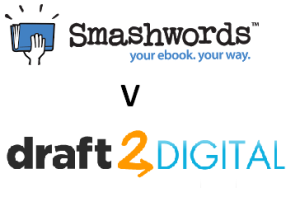 Since I started self-publishing in 2011, Smashwords has been the overwhelming favorite for savvy self-publishers who wanted or needed a distributor to reach non-Amazon e-bookstores. However, a new competitor called Draft2Digital launched a beta version of their service earlier this year and has been gaining popularity. In July, they hit 1,000 users, 10,000 titles, and 1,000,000 books sold.
Since I started self-publishing in 2011, Smashwords has been the overwhelming favorite for savvy self-publishers who wanted or needed a distributor to reach non-Amazon e-bookstores. However, a new competitor called Draft2Digital launched a beta version of their service earlier this year and has been gaining popularity. In July, they hit 1,000 users, 10,000 titles, and 1,000,000 books sold.
I’ve been getting lots of questions about Draft2Digital, and experimenting with them myself, so I thought it was a good time for a side-by-side comparison as there are distinct pros and cons to each service. But before we get into that, let’s look at the question of whether you need to use a distributor at all.
Read the rest of the article here!
Reblogged from David Gaughran:
 Since I started self-publishing in 2011, Smashwords has been the overwhelming favorite for savvy self-publishers who wanted or needed a distributor to reach non-Amazon e-bookstores. However, a new competitor called Draft2Digital launched a beta version of their service earlier this year and has been gaining popularity. In July, they hit 1,000 users, 10,000 titles, and 1,000,000 books sold.
Since I started self-publishing in 2011, Smashwords has been the overwhelming favorite for savvy self-publishers who wanted or needed a distributor to reach non-Amazon e-bookstores. However, a new competitor called Draft2Digital launched a beta version of their service earlier this year and has been gaining popularity. In July, they hit 1,000 users, 10,000 titles, and 1,000,000 books sold.I’ve been getting lots of questions about Draft2Digital, and experimenting with them myself, so I thought it was a good time for a side-by-side comparison as there are distinct pros and cons to each service. But before we get into that, let’s look at the question of whether you need to use a distributor at all.
Read the rest of the article here!
Published on August 30, 2013 13:11
August 23, 2013
Guest Post: The Balance of Magic in Velyn by Anthony DeRouen
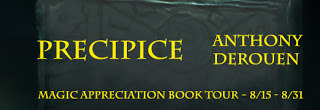
I am pleased to have indie author Anthony DeRouen as a guest today as part of the Magic Appreciation Tour. He's just released Precipice, the first book in his series, A Show for the Gods, and he'll be telling us the magic he's used. The myriad of magic systems in the world of fantasy fascinates me; there is a color and flavor for every taste, and I want to sample them all! One bite at a time, eh? We start off with a short excerpt from Anthony's book, where we get to see the magic in use, then I'll turn the time over to him...
The Balance of Magic in Velyn – For Good or For Bad
Kiruna left the alley and marched for the front gates, hands on her sides, commanding the air about her. Hurin stood up and watched Kiruna Del Ray construct flows of air like a gathering tornado as she conjured a mighty funnel of power. Rocks and debris joined the growing currents until Hurin’s view of Kiruna was no longer.
An archer manning the parapets of Caelos Temple cried out in alert, pointing to a lone woman approaching the front gates. They could feel the surrounding air drawing them closer to the woman like a tornado sucking in the air around it. Many fell over, unable to draw breath, desperately reaching for anything to keep them steady.
“Hold there or we will fire!” Another archer screamed for her to stop. The trample of boots against stone announced the arrival of more guards racing for the gates.
The archer shouted again. “This is your last warning!” He nocked an arrow and drew his bow, taking aim. Other men followed suit, slamming against the ledge while angling their bows down.
In one fluid motion, Kiruna clasped her hands together, smashing the powerful weaves into a single column and released. Guards atop the curtain walls gazed curiously at a wall of dust and debris, some with their jaws hanging open. The concussive blast ripped the curtain wall into pieces.
The night shuddered. Men blew apart like leaves in the wind, some taking flight clear over the temple roof and the adjacent cliffs, and the horrific shower of debris pulverized others. Large sections of stone crashed violently into the foremost columns of the temple. Beyond the chaos of flying stone shards and boiling dust, Kiruna saw glimpses of burgundy plated men racing for safety. The damaged columns soon gave way and collapsed onto the steps, producing a cloud of dust over the courtyard. More sections continued to rain down throughout the temple proper, spreading the destruction further.__________“Magic can heal, and magic can destroy. How magic is employed relies solely on the person wielding it. Every magicbearer should understand the consequences of their actions, and how the smallest channeling can reverberate throughout the entire world.” – Danika Del Ray (Precipice)
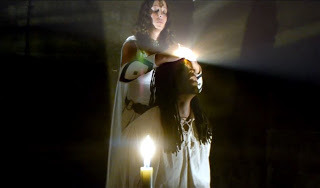 (a still from the trailer)As part of my ongoing Precipice book tour, I had the pleasure of delving into the history of magic on James L. Wilber’s blog. For Robin’s amazing and fantastical blog I’m going to discuss how magic is channeled and the balance required in using it.
(a still from the trailer)As part of my ongoing Precipice book tour, I had the pleasure of delving into the history of magic on James L. Wilber’s blog. For Robin’s amazing and fantastical blog I’m going to discuss how magic is channeled and the balance required in using it.When Cassiel, the God of Fire, gifted the races of Velyn with magic, a violent shift in power took place. Those born with the gift rose to prominence in all avenues of society. Kings, queens, barons, marshals, chancellors all. Some used the blessing for good, others for darker deeds. Realizing the dire consequences should a conflict erupt between magicbearers and those without, the other four gods implemented a counterbalance called the Ometh-Rua.
The Ometh-Rua can be thought of as a scale. Its purpose: to support and limit the channeling of mystical energies. One side of the Ometh-Rua contained the person’s natural energy, with whatever form of magic the person carried on the other side, be it arcane or divine. The Ometh-Rua essentially prevented the person from channeling unlimited amounts of energy. The person could only expel the amount of magical energy it had on the natural side. Fatigue would set in quickly should the person expel too much magical energy too fast. Should the person overexert themselves through physical activity, like fighting or running, they would find little in the way of magical energy to use until they recovered their strength.
Wizards and sorcerers of the ancient time realized the only way to regain a shadow of their former stature was to raise their physical endurance. This worked for a period, until the Nijelon Order’s artificers discovered a method of extending the use of magic through enchanted jewelry. A small, round disc called a glyph would contain a blood sample from the wizard, preventing anyone else from using it. When the glyph would come in contact with the person’s skin, its power would flow through the body, strengthening the magical side of the Ometh-Rua without tipping the balance. The natural way to wear a glyph was by necklace. Through iteration, glyphs became powerful enough to supplant a spellcaster’s energy pool tenfold.
Only those who dedicated their lives to the Nijelon Order and vowed to embody its principles were bestowed a glyph. But not all who are dedicated to the prestigious order carry good intentions in their hearts. Some within the order will journey down a darker path, where deadlier powers await.
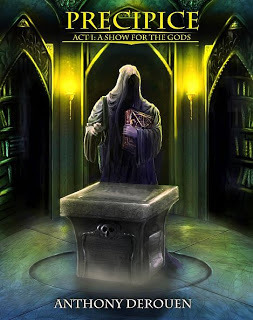
About the BookPrecipice is an epic fantasy adventure revolving around Danika and Kiruna Del Ray, two sisters born with unique mystical abilities who must retrieve a stolen book of magic before its power can be harnessed for evil. Together, they must battle to overcome an array of obstacles impeding their quarry, arising not just from the enemy, but also from allies who secretly work against them. Precipice is the first thrilling act in the A Show for the Gods series.
PurchaseAmazon, Smashwords, Barnes & Noble, Sony
About the Author
 Anthony DeRouen was born and raised in Redwood City, California. Anthony began writing short stories and fan fiction in 2008. He has published one novel and written two others in the A Show for the Gods series: Precipice, Diviner, and End of Dreams.
Anthony DeRouen was born and raised in Redwood City, California. Anthony began writing short stories and fan fiction in 2008. He has published one novel and written two others in the A Show for the Gods series: Precipice, Diviner, and End of Dreams.A growing passion for online role-playing games introduced Anthony to the world of fan fiction where he compiled numerous stories and articles for his fellow guildmates to enjoy.
In 2009 while drafting a fantasy article for a friend’s gaming website he fell love with the concept of a battle healer who defends a country not her own against sinister forces bent on releasing a terrible power. A number of plot lines were developed along with how the world would appear at the height of its economical and political strength in the beginning, and then deteriorate as events unfolded.
When Anthony is not writing, he’s playing MMO’s such as Guild Wars 2, training for obstacle course runs, or supporting his son’s Boy Scout troop #819.
Website * Facebook * Goodreads * Twitter
Published on August 23, 2013 10:05
August 12, 2013
Guest Post Cover Reveal: Vanna Smythe
Vanna Smythe's Anniversary of the Veil series sports one lovely cover modified for each book, and I am delighted to be able to share this one with you as she gears up to release her new book. Forever Husband is the third and final installment in the series, and brings the story of Kae and Issa to a satisfying conclusion. While the book can be considered a standalone novel it is greatly enhanced by first reading the parts one and two of the series, Protector and Decision Maker.
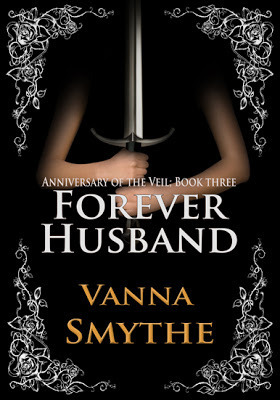
Purdy, ain't it? It looks so very elegant.
Links to the other books in the series:
Protector (Anniversary of the Veil, Book 1)
Decision Maker (Anniversary of the Veil, Book 2)
and to her blog:
Vanna Smythe, Fantasy Author
Published on August 12, 2013 10:14
August 9, 2013
It's a Giveaway!
Matthew Keith, reviewer and author, is one of those neat people on the Indie Front who puts a lot of time into helping out other folks and spreading the word about books he's read. He's recently begun a spotlight series featuring books he's reviewed, and now there's a giveaway. Woot! Free books!
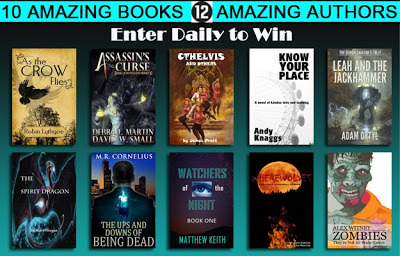
The giveaway runs from 8/8/2013 until (midnight) on 8/24/2013and is hosted by Matthew Keith Reviews.10 chances every day.
When you're done with your entry, be sure to share the news!
a Rafflecopter giveaway

The giveaway runs from 8/8/2013 until (midnight) on 8/24/2013and is hosted by Matthew Keith Reviews.10 chances every day.
When you're done with your entry, be sure to share the news!
a Rafflecopter giveaway
Published on August 09, 2013 14:03



